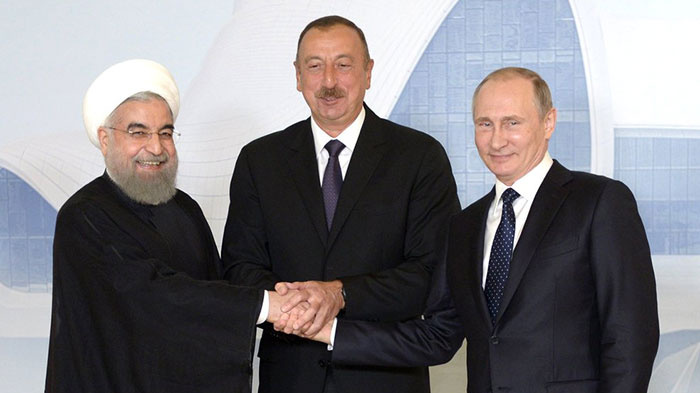What to Expect from Trilateral Baku Summit

President Rouhani has just returned from a two-day trilateral summit in Baku, supposed to culminate in great gains ranging from nuclear cooperation to transit, and foreign investment for Tehran.
The talks embraced a variety of issues, as planned. “On August 8, 2016, we will meet […] to discuss the prospects for developing long-term and mutually beneficial cooperation that would span diverse areas: from economic and humanitarian ties to security and the fight against terrorism,” Putin told the Azerbaijani State News Agency AZERTAC in an interview.
On the flipside of security issues came expansion of military cooperation. Both Azerbaijan and Iran are interested in Russia as the biggest exporter of high-quality weapons, Russian Deputy Prime Minister Dmitry Rogozin said on Monday after talks between the leaders of Russia, Azerbaijan, and Iran, Russian news agency TASS reported. Rogozin have discussed military projects in Azerbaijan at length but provided no specific details on Iran.
Even prior to the summit, the Russian President Vladimir Putin had signaled Moscow’s will to widen strategic partnership with its top Middle East ally. According to Sputnik, Putin had reiterated that Moscow would maintain “its support for Tehran’s aspirations to become a full-fledged member of the Shanghai Cooperation Organization”. He also announced a new package of financial support Moscow would grant to Tehran, including two state loans amounting to 2.2 billion euro [$2.5 billion]. The loans are intended to finance the construction of a thermal power plant near the city of Bandar Abbas on the Persian Gulf coast and the electrification of the Garmsar–Ince Burun railway section in the northeast of the country.
Putin also described the nuclear relations between his country and Iran as strategic partnership, deeming it particularly true of the joint work in the field of peaceful nuclear energy. “We will further assist our Iranian partners in implementing the JCPOA, including the processing of enriched uranium and the conversion of facilities to produce stable isotopes,” Putin said.
Putin also expressed optimism about bilateral trade with Iran in the wake of the nuclear deal. “Through collective efforts, we have managed to increase the volume of mutual trade [with Iran]. In the first five months of this year, it grew by 70 percent, reaching $855 million,” Sputnik quoted Putin as saying.
But perhaps the most important chunk of the deal in the summit officially declared is the highly anticipated International North-South Transport Corridor. Few details have emerged from the talks, but again we could guess from what was revealed in advance.
“Our talks will focus on a flagship project; the International North-South Transport Corridor with a total length of 7,200 kilometers. It aims to provide the best possible opportunities for transporting transit cargo from India, Iran, and the Gulf States to Azerbaijan, the Russian Federation and further to Northern and Western Europe,” Putin said.
In the words of Abbas Akhoundi, Iran’s Minister of Roads and Urban Development, the corridor, which connects the Black Sea to the Persian Gulf, will be a transit route that interconnects Persian Gulf states and even Africa, Central Asia, Russia, China and eventually the Europe. Akhoundi hopes this could help facilitate tourism between Iran and Azerbaijan, given separate agreements to launch a railroad between Mashhad and Nakhchivan. An Astara-Rasht railroad project worth $1 b has also been agreed, with each side bringing half of the credit needed. The sides are also trying to facilitate visa issuance and that will most probably guarantee a boost in bilateral trade and tourism.
The Rouhani administration seems to have found the opportunity to advance suspended international projects in line with its policies of détente in foreign relations and economic diplomacy in the wake of the nuclear deal and the North–South corridor is one that could be pivotal for the country’s economy in the future. The project has fallen behind China’s silk railroad now operational. Despite its many advantages, the corridor might as well turn into an accelerator for imports and becoming a threat to the domestic production, as was the case with excessive imports from China under Ahmadinejad that led to the bankruptcy of many Iranian manufacturers.

